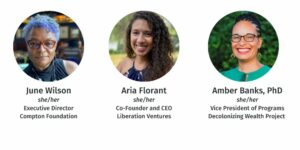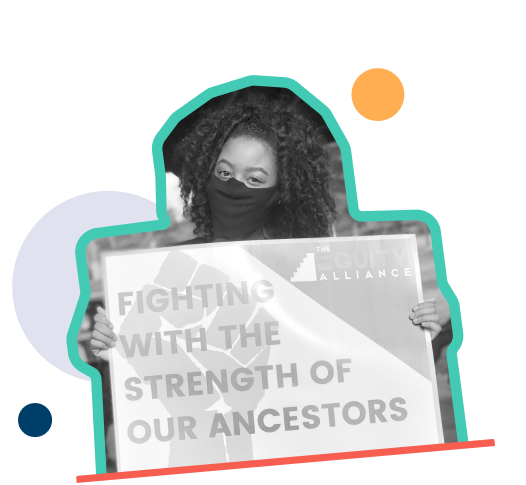Recent years have witnessed racial uprisings that mobilized the largest swath of the American population calling for an end to anti-Black violence and the systemic racism pervasive in all aspects of our lives. National discourse about the harms and costs of racial inequity, organizing by increasingly powerful social movements, growing numbers of young progressives committed to racial repair, and more widespread support from Democrats have turned up the volume on the topic of reparations. According to data gathered by Liberation Ventures, national public support for reparations has grown significantly over the last 25 years. Support was at ~15% in 2000; today, it sits at around 31%. Growing numbers of philanthropic institutions are exploring the link between the origin story of philanthropic wealth and reparations, with some linking reparations with the decision to Spend Out.
At this NFG Member Call with Compton Foundation, Liberation Ventures, and Decolonizing Wealth Project, we’ll explore the link between philanthropy and reparations and identify what you can do to wade into supporting reparations and allied actions that support racial repair.

Resources:
- "A Dream in Our Name", by Aria Florant, published on LiberationVentures.org (Feb. 2023), articulates the rationale and vision for Black-led reparations and racial repair.
- “Philanthropy’s Role in Reparations and Building a Culture of Racial Repair,” published on Bridgespan.org (Sept. 2023), amplifies the work of many leaders across the movement and invites funders who believe in racial equity and aspire to a thriving multiracial democracy, to see reparations for Black people and building a culture of repair as a necessity to reach that goal
- “A Reparations Roadmap for Philanthropy,” published on SSIR.org (Sept. 27, 2023), offers tangible guidance to philanthropy and examples on how to invest in the reparations ecosystem to help build a culture of repair.
- “Reparations and Redistribution,” (2021) published by Resource Generation, this primer makes the distinction between wealth redistribution and reparations and suggests ways to participate in both.
- “Cracks in the Foundation: Philanthropy's Role in Reparations for Black People,” a report by National Committee for Responsive Philanthropy (Jan. 2024), examines the lasting impacts of enslavement and racially discriminatory practices on the lives of Black people residing in Washington, DC, and makes the case that foundations have an immediate opportunity and responsibility to address society’s past harm in order to help communities heal and thrive.
- "The Case for Reparations in Philanthropy," published by Nonprofitquarterly.org (Feb. 14, 2024), is the second article in NPQ’s series, The Vision for Black Lives: An Economic Justice Agenda, that is co-produced with the Movement for Black Lives (M4BL). In this interview with Dr. Amara Enyia, Temi Bennett, Co-Director of if, A Foundation for Radical Possibility, shares how they are framing reparative philanthropy, how it shapes their work in reparations, and the biggest challenges and opportunities at this moment.
- Compton Foundation’s Executive Director, June Wilson, reflects on why and how reparative action and spend out are connected, and reparative action grantee-partners.
- The Reparations Narrative Lab, Liberation Ventures first narrative program, assists organizers, artists, and organizations to build narrative power and increase public support for reparations.
- "Reparations Polling Roundup: The last 25 years," published by Liberation Ventures (Mar. 13, 2023), is a consolidated database of results from public opinion polls that have asked people about their beliefs related to reparations over the last 25 years. The roundup offers takeaways on the trends observed that center on what we can learn from change over time, and preliminary analysis on the implications for movement organizations and future polling efforts based on this data.
- “Helping Movements Meet the Moment: What Philanthropy Can and Must Do,” published by Nonprofitquarterly.org (Jan. 18, 2024), invites progressive funders to examine why the problems they have sought to address continue to persist, and shares five steps that philanthropy can take to expand movement power, and concrete examples of actions foundations have already begun to take. The article concludes with “signs of hope,” citing the ongoing conversations and increased support for reparations within social justice philanthropy.
- “Racial Justice Programs Under Fire: Foundations Are Running Scared When They Should Double Down,” published in The Chronicle of Philanthropy (Feb. 6, 2024), reveals eight troubling examples of pervasive philanthropic backsliding following the Supreme Court’s ruling last summer against affirmative action in college admissions. These examples come from workshops and direct conversations with more than 100 organizers and foundation staff held by the Philanthropic Initiative for Racial Equity.
Event Details
When
Feb 20, 2024
10:00 am - 11:30 am PT
Where
Virtual
